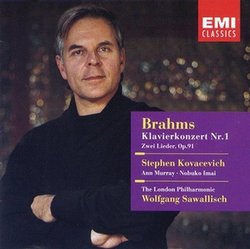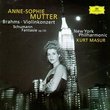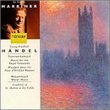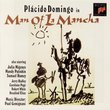| All Artists: Johannes Brahms, Wolfgang Sawallisch, London Philharmonic, Stephen Kovacevich, Ann Murray, Nobuko Imai Title: Brahms: Piano Concerto 1 / Two Songs Op. 91 Members Wishing: 0 Total Copies: 1 Label: EMI Classics Imports Release Date: 2/27/2001 Genres: Pop, Classical Styles: Vocal Pop, Opera & Classical Vocal, Chamber Music, Forms & Genres, Concertos, Historical Periods, Classical (c.1770-1830), Instruments, Keyboard Number of Discs: 1 SwapaCD Credits: 1 UPC: 077775457827 |
Search - Johannes Brahms, Wolfgang Sawallisch, London Philharmonic :: Brahms: Piano Concerto 1 / Two Songs Op. 91
 | Johannes Brahms, Wolfgang Sawallisch, London Philharmonic Brahms: Piano Concerto 1 / Two Songs Op. 91 Genres: Pop, Classical
![header=[] body=[This CD is available to be requested as disc only.]](/images/attributes/disc.png?v=4eeb5dd5) ![header=[] body=[This CD is available to be requested with the disc and back insert.]](/images/attributes/disc_back.png?v=4eeb5dd5) ![header=[] body=[This CD is available to be requested with the disc and front insert.]](/images/attributes/disc_front.png?v=4eeb5dd5) ![header=[] body=[This CD is available to be requested with the disc, front and back inserts.]](/images/attributes/disc_front_back.png?v=4eeb5dd5) |
Larger Image |
CD DetailsSimilar CDs
Similarly Requested CDs
|
CD ReviewsA great recording of the Brahms 1st 02/18/2001 (5 out of 5 stars) "This 1992 recording bowled over the critics when it came out, and it's easy to see why. Kovacevich takes the outer movements at a faster clip than most performers, but the music never sounds rushed: the first movement is highly charged with passion and fury but also gentle eloquence, and the third movement is nearly as exciting. And what a slow movement! This is probably the most beautiful Adagio of the Brahms 1st that I've heard. In all, a great recording of an underappreciated work, even though this piece is by no means short on great recordings. The recording itself is demonstration-quality: I've never heard better. The two Op. 91 Lieder are also beautifully done." The Definitive Brahms 1st Piano Concerto John Kwok | New York, NY USA | 04/12/2001 (5 out of 5 stars) "Kovacevich gives a spellbinding performance of Brahms' 1st Piano Concerto. Although he is a speed demon at the keyboard, he never forsakes his excellent technique. And I might add that his playing is as vibrant and lyrical as Gilels' critically acclaimed Deutsche Grammophon performance (Gilels/Jochum/Berlin Philharmonic.). Without a doubt, this has to be one of the two great recordings of the Brahms 1st, alongside Gilels'. Sawallisch and the London Philharmonic are admirable accompanists, playing as well as their peers in Berlin. Those looking for a modern digital recording should regard this as their first choice." A Very Special Recording M. C. Passarella | Lawrenceville, GA | 10/02/2005 (5 out of 5 stars) "If Brahms were a less cautious artist with less of a sense of musical history and his place in it, his First Concerto might have been his First Symphony. Instead, it transmogrified from symphonic sketch to sonata for two pianos to concerto over the course of the several years needed to bring it to completion. The concerto is nonetheless symphonic in sweep, in scope. Despite the fact that Brahms was uncertain about orchestration and (according to pianist Charles Rosen) didn't know how to write a grand orchestral finale and so resorted to an imitation of the last movement of Beethoven's Third Concerto, the First Concerto perfectly mirrors the emotional burdens under which the composer wrote the piece. It reflects the tragedy of the decline and death of Brahms's mentor Robert Schumann and the turmoil Brahms felt over his love of Clara, Schumann's widow. Unlike the Beethoven concerto, its major-key conclusion doesn't seem dishonest and tacked on. It's the kind of heroic conclusion we expects in a composition where the composer "wins through" his tragic predicament, but it doesn't seem entirely conclusive. The concerto seems to me as open-ended and equivocal as Brahms's position, on the verge of a great musical career yet haunted by the emotional past, including the past he shared with the Schumanns.
I've come to like the First more than the Second, once just about my favorite piano concerto. But I think the gemutlich conclusion of the Second Concerto less inspired, less right than the supposedly copycat finale of the First. And as gorgeous as the slow movement of the Second Concerto is, with its famous cello solo, the slow movement of the First is even more heartfelt, a picture of repose in grief, a portrait of Clara by Brahms's own admission. Certainly this recording by Kovacevich is one of the main reasons I've come to love the First more than the Second. No one has captured the Herculean struggle of the first movement better, abetted by an equally large conception on the part of conductor Wolfgang Sawallisch. No one has better captured the deep sorrow and fleeting comfort of the middle movement either. And as to the last movement, I defy anyone to think of it as a less than worthy conclusion to this vast drama--at least as Kovacevich and Sawallisch present it. EMI provides equally large-scale, imposing sound engineering. Few recordings I know have more successfully presented a unified conception of a musical work than this. The two songs form a lovely postscript, the first tender and autumnal in Brahms's late style, the second a gentle lullaby that seems to recapture more youthful emotions. Lovely performances from Kovacevich, Murray, and Imai." |

 Track Listings (5) - Disc #1
Track Listings (5) - Disc #1










